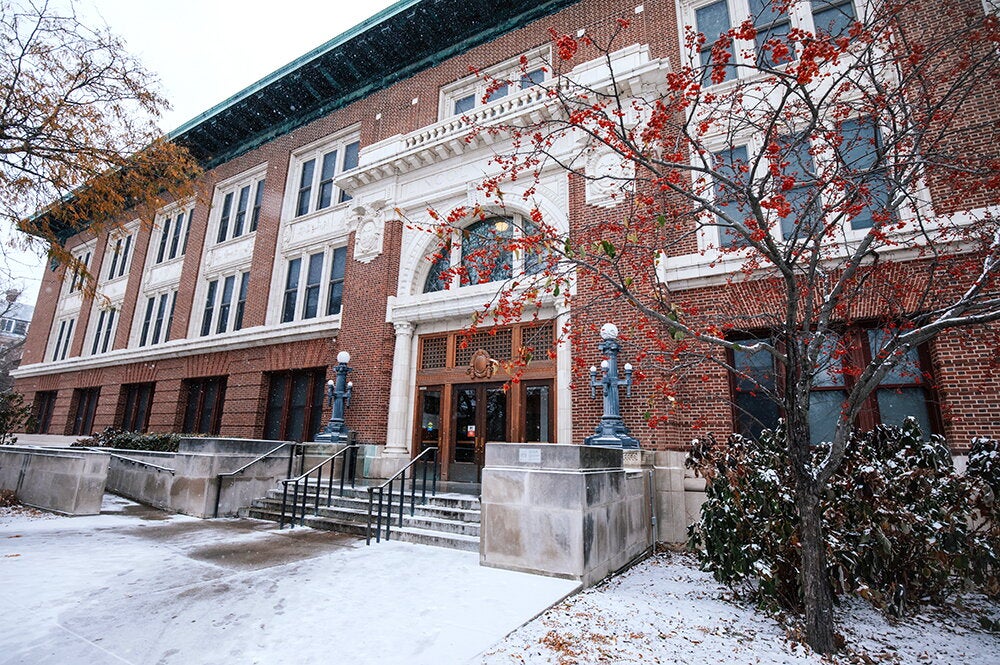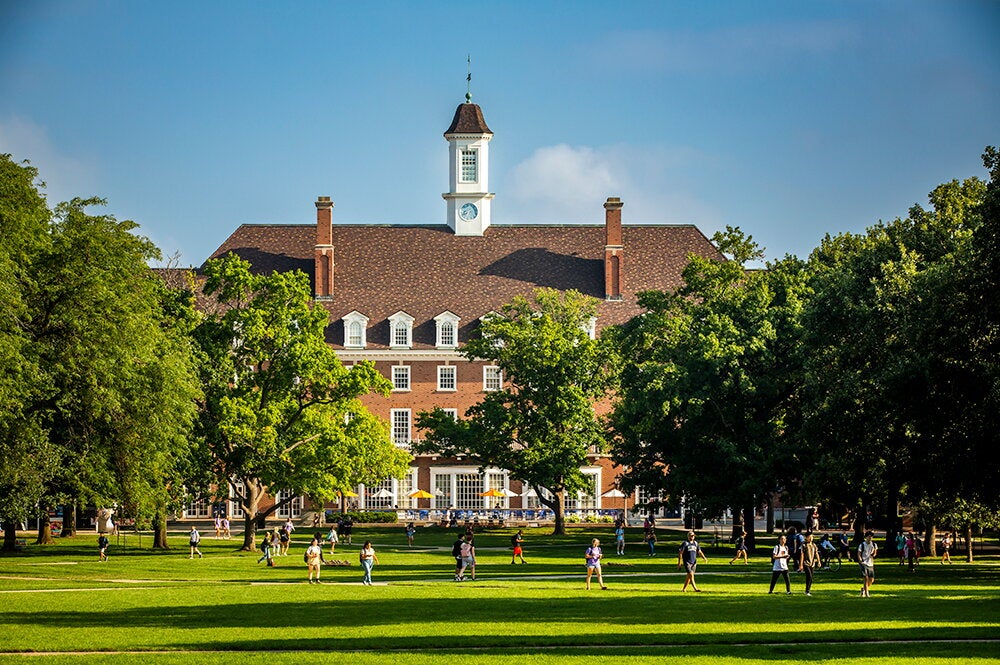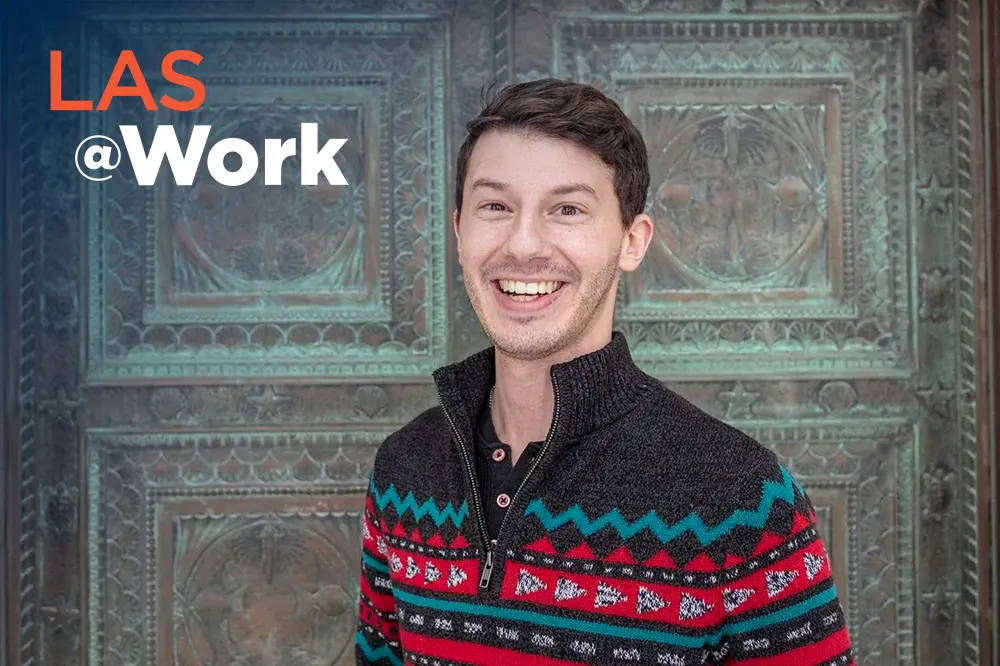
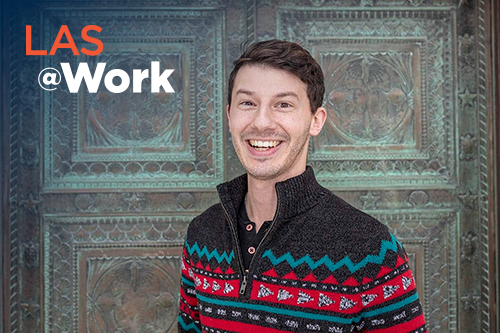
Chicago’s Joseph Frumkin (BS, ’13, integrative biology) is the guest engagement coordinator with Lincoln Park Zoo. From designing public education presentations to managing the fellowship program, Frumkin has found that informal education diving into animal care and conversation combines skills that he honed while studying at Illinois.
Please briefly describe a typical workday. Also, what is an example of the most interesting aspect of your job?
I’m thankful that a day at the Zoo is far from typical, which is what I love. In general, the guest engagement team focuses on using interpretation to tell stories related to our animal care and conservation work. We engage the public to try and inspire them to take their own action to help protect wildlife. The way we do this can vary day to day; sometimes it involves me delivering a program to an audience of 500 people, while other times it involves mentoring our Guest Engagement Fellows on how to prepare for a career in free-choice learning environments. This ultimately makes for the most interesting aspect of my job. Working with the public or early-career professionals always presents a new audience at varying levels of knowledge, but all passionate about wildlife. It makes every conversation I have on zoo grounds a unique one, which has me continually learning something new.
What was your first job out of college?
My first job out of college was a research fellowship with the Urban Wildlife Institute at Lincoln Park Zoo. I truly do believe that it was because of the lifelong career relationships I built and maintained from that fellowship that helped me find full-time employment with the zoo. My advice would be to always keep your early career connections because you never know when it might land you your dream job.
How did you land that first job?
This first job was obtained by leaning into my passion for wildlife. In any interview, let your geeky passion and excitement for the natural world shine through. I’d say many times, employers are looking at your dedication and drive to learn more than anything else. By embracing your authentic self, you can land the job. Any position that’s looking for you to change your personality for the role, or fit a mold, ultimately doesn’t deserve you. Be quirky and weird…they will remember you when all other candidates seem the same.
In hindsight, what about college best prepared you for your life and career?
The emphasis on communicating with peers best prepared me for my career. Many classes I took had components that focused on group discussion and collaboration. I use these skills daily in every role I have ever held. Classes like field ecology, herpetology, insect ecology, and more all encouraged group learning through collaborative labs and research projects. These opportunities were perfect in allowing me to both share my passions with my peers, but also to learn from their interests. This ultimately helped me learn more than any exam ever could. It’s through our colleagues’ unique areas of expertise that we learn the most.
How did your major prepare you for your career?
I remember initially looking for a major at the University of Illinois after entering undecided in 2009 and entering my academic advisor’s office to explore what a major in biology might look like. Integrative biology’s ability to encourage their students to explore all aspects of the natural world in whatever way they wanted to was apparent from that first meeting. I could never pick an area within biology that I gravitated towards more than another. I was always hoping to learn something new, ultimately keeping my interests broader rather than focusing on any specific research topic. In my career, the themes and topics you focus on through an educational lens are always changing. However, it’s that burning passion to continue exploring novel concepts that helps to craft the perfect program. It’s because of integrative biology’s ability to fuel that flame that helped me to thrive.
What do you like best about your work?
Without a doubt, it’s the people. Every place I have worked, I have always met interesting folks that provide unique perspectives to the team and have stories to tell. One colleague of mine was a history major before coming to work at Lincoln Park Zoo, where he stayed for 14 years working with teens. Another colleague of mine has an acting background but now delivers aquatic presentations focused on marine mammal anatomy at Shedd Aquarium. Each of these people has had their own journey and their perspectives have helped to guide my own professional path. I think we learn the most from those who are most different from us. Free-choice learning environments tend to gather those with different experiences from your own into one place, providing ample opportunity for you to listen and learn from them.
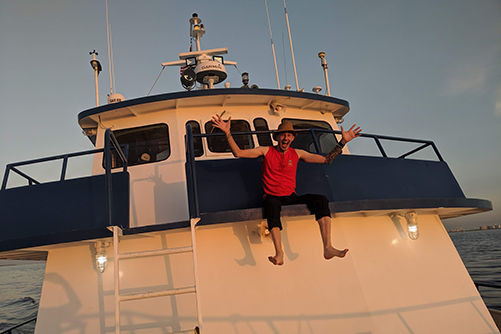
Please describe your proudest achievement.
My proudest achievement was while working as an engagement specialist with Shedd Aquarium. My focus at Shedd was to create programs that could engage the public in scientific research. A goal of many of my programs was to invite our guests to “step into the shoes” of a researcher to better understand our global conservation efforts. I did this through a variety of small projects, but my favorite was a program I designed called From the Field to the Floor. This program sent interpretive educators out into the field with a researcher, and we were able to live stream research in action back to the floor at Shedd Aquarium. Guests could engage scientists and interpreters through the live stream and be a part of research in action without having to leave Shedd. The program’s success gave me the opportunity to spend 10 days on Shedd Aquarium’s research vessel in the Bahamas where I was able to live stream an expedition with our marine research team, focusing on grouper population dynamics. It was a highly collaborative process among educators and researchers that defines how I approach building all my programs to this day.
Editor's note: This LAS@Work profile is part of a series that features College of LAS alumni and their careers. Visit here to read more.
